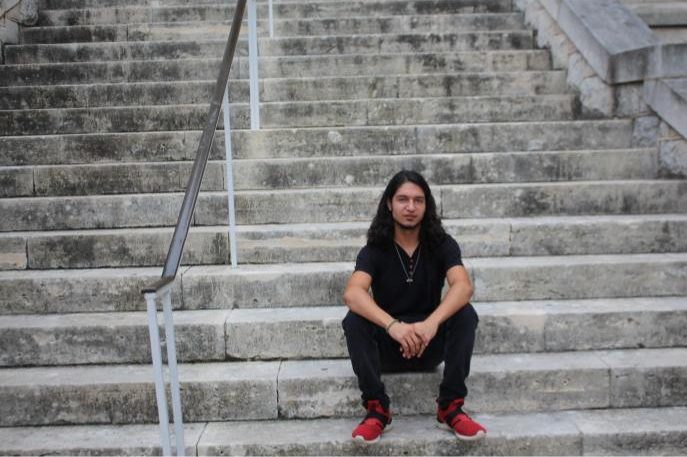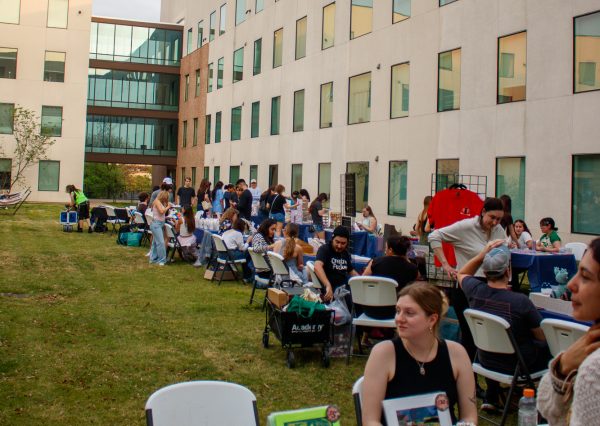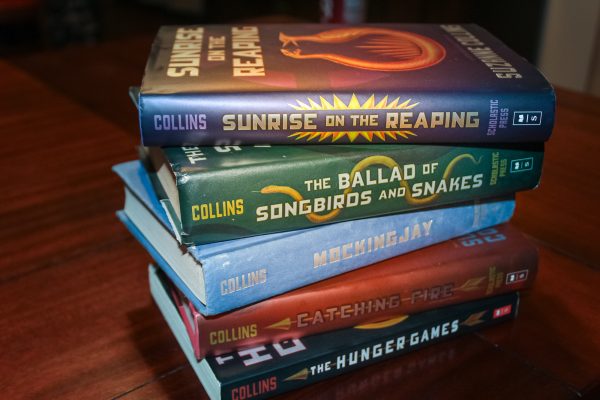Student reflects on how music connects him to Hispanic heritage, culture
Madalaine Mayes / Hilltop Views
Santiago Clark sitting on the steps of Trustee Hall. Clark is a senior Entrepreneurship major at St. Edward’s University.
Late in the afternoon, the sun is peeking over the Austin horizon. The music is tantalizing, and Clark strokes the strings on his guitar ever so passionately. At the last tree on the lawn, he and I sat facing one another — the ground still damp from the previous day’s rain. The melody rang out: a Spanish song of relaxation and youth. Through the music, we transported ourselves to the streets of Bogota, Colombia. A destination of legacy and heritage. Where a passerby, curious about the unfamiliar sighting, paused before continuing about the day’s stressors.
“I started music when I was about 15 years old. I had been playing sports my whole life like basketball and soccer, but I never made the high school team,” Clark said.
Since he didn’t make the team, he began to think about the things that he did besides playing sports because that was his passion. And for him, he put on music. He imagined his passion for music in two ways: as a rapper or as a guitar player. He listened mainly to one type of music at the time.
“All the rap I was hearing was like money, girls, gold…I was 15 years old and I didn’t have any of that…but I liked the beat,” Clark said.
Around the same time, he also began thinking about the guitar.
“(The) guitar… something you can sit down and just practice and just continue to get better at,” Clark said.
He shared memories of being six years old and of the precious moments he had with his family.
“(My mother) put on some Spanish music, but mostly it was Michael Jackson or Tracy Chapman. But I still remember it, ‘till those days, her, my grandpa and my grandma, they loved salsa,” Clark said.
Both he and his mother were born in Bogota, Colombia, but they moved to the United States when he was a year old. As he grew older, he discovered salsa was rooted in his Spanish heritage, as well as dances like Cumbia and Bachata. The deeper he studied beats and rhythms of different music genres — especially afro-pop — the more he was reminded of Spanish music he listened to growing up.
“I mean they would go to salsa dance parties and I was like, wow I want to do that… It became a thing of beauty and bondage and passion,” Clark said.
Clark would like to go back to Colombia after college.
“I would like to save up some money and visit family members I’ve never met before,” Clark said.
Because he is Spanish and American, he always felt in between. There is always a part of him that must acknowledge the fact that some Spanish people around him will ask him to be either one or the other, and vice versa, some Americans will ask him to be one or the other.
“So that’s the thing I always felt separated me from most people,” Clark said.
On many occasions other Hispanic people will come up to him assuming he knows their version of Spanish and when he can’t understand them they get disappointed, because of his background and experiences with stereotyping, sometimes he feels isolated in the U.S.
“There’s a thing where you feel you grew up in the U.S. even though you are born out of another country,” Clark said.
Clark felt he had an identity crisis growing up, but it was music that united him with the people in his life. He formed a wide range of global music knowledge and today, it ultimately helps him create spaces for everyone to belong — himself included — using his talent.
“The way it makes people feel… but when you hear it live, when you see people move to it. I mean it’s really magic. It blows my mind and it really just takes people out of their mind,” Clark said.







